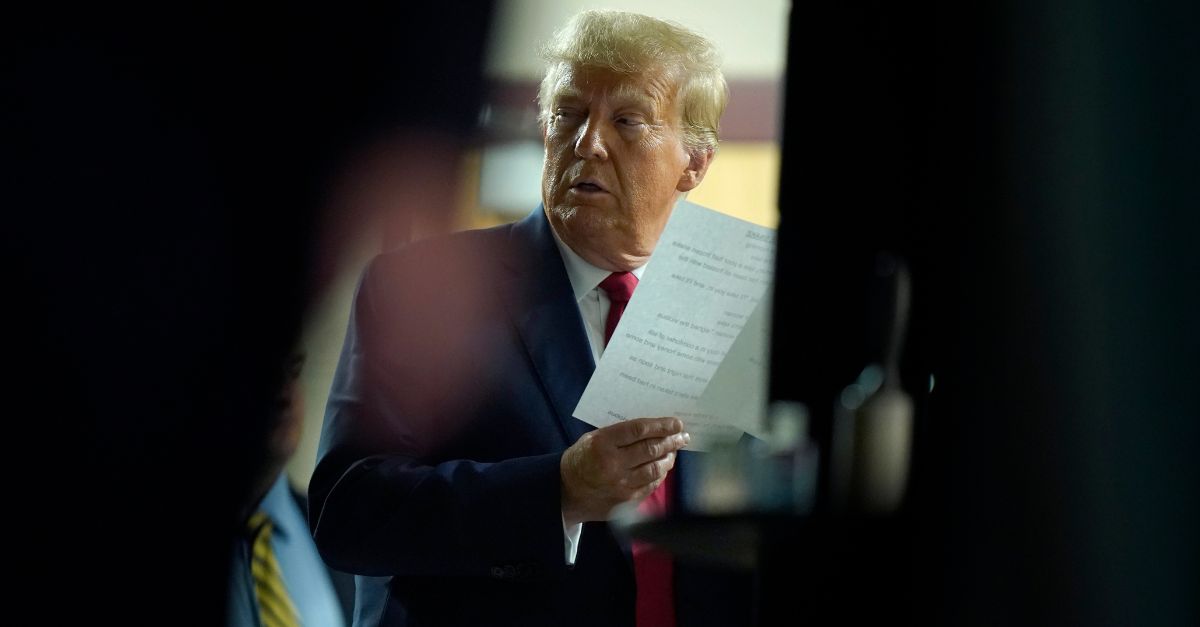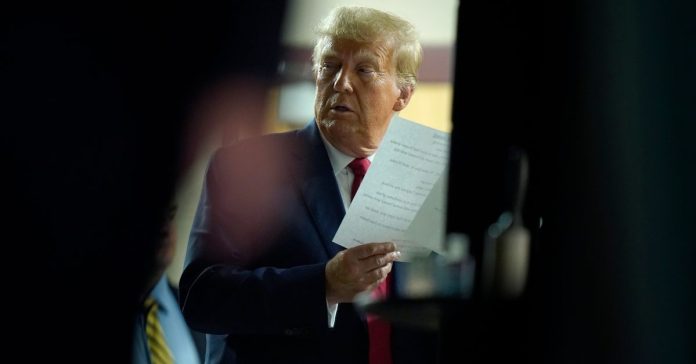
Former President Donald Trump holds papers moments before stepping on stage to address an audience at a campaign event, Monday, Oct. 9, 2023, in Wolfeboro, N.H. (AP Photo/Steven Senne)
Donald Trump has appealed a ruling from a federal judge that bars the former president from verbally attacking federal prosecutors and potentially influencing would-be jurors ahead of his criminal trial for interfering with the results of the 2020 presidential election.
In a three-page order issued Tuesday, U.S. District Judge Tanya Chutkan barred Trump, his lawyers, federal prosecutors and others from publicly making statements aimed at the major players in the case and potential future jurors.
“All interested parties in this matter, including the parties and their counsel, are prohibited from making any public statements, or directing others to make any public statements, that target (1) the Special Counsel prosecuting this case or his staff; (2) defense counsel or their staff; (3) any of this court’s staff or other supporting personnel; or (4) any reasonably foreseeable witness or the substance of their testimony,” wrote Chutkan, a Barack Obama appointee.
Trump filed his notice of appeal of the order within hours.
In considering the order, Chutkan acknowledged “undisputed testimony” from the government that when Trump issued his public missives, “those individuals are consequently threatened and harassed.” Those “individuals” in this case have included “potential witnesses, prosecutors, and court staff.”
Chutkan found that Trump’s statements “pose a significant and immediate risk” of intimidating or otherwise influencing witnesses in the case who may fear being similarly targeted, and that “attorneys, public servants, and other court staff will themselves become targets for threats and harassment.”
“And that risk is largely irreversible in the age of the Internet; once an individual is publicly targeted, even revoking the offending statement may not abate the subsequent threats, harassment, or other intimidating effects during the pretrial as well as trial stages of this case,” the judge continued.
Chutkan rejected the defense’s argument that Trump could say whatever he wanted because he is engaged in a presidential campaign.
“First Amendment rights must yield to the imperative of a fair trial,” she wrote.
“The bottom line is that equal justice under law requires the equal treatment of criminal defendants; Defendant’s presidential candidacy cannot excuse statements that would otherwise intolerably jeopardize these proceedings,” she added.
The judge was clear that the order was limited only to specific communications, clearing a path for the former president to continue to air his grievances about his perceived enemies.
“This Order shall not be construed to prohibit Defendant from making statements criticizing the government generally, including the current administration or the Department of Justice; statements asserting that Defendant is innocent of the charges against him, or that his prosecution is politically motivated; or statements criticizing the campaign platforms or policies of Defendant’s current political rivals, such as former Vice President Pence,” the order says.
Special counsel Jack Smith sought the gag order amid growing concerns that Trump could taint the prospective jury pool or scare off witnesses with threats or intimidation in his impending election subversion trial in Washington, D.C.
Trump was charged with four felonies related to his alleged efforts to overturn the results of the 2020 election both ahead of and on Jan. 6, 2021. He has pleaded not guilty to all.
In line with his longtime practice of publicly airing grievances and conspiracy theories in equal measure, the former president has regularly attacked those handling the case, including Smith. He has lashed out at former chairman of the Joint Chiefs of Staff Gen. Mark Milley, U.S. Attorney General Merrick Garland, and the U.S. Justice Department overall. He has also blamed the Biden administration for the indictment and demanded the judge overseeing the case recuse herself, citing baseless claims of prejudice. The motion was denied.
In addition to Trump’s message vowing “if you go after me, I will go after you,” targeting the special counsel, prosecutors also highlighted baseless accusations hurled at Milley. Trump claimed Milley fed information about his administration to China and had committed a “treasonous act.”
Trump wrote on his social media platform Truth Social in reference to Milley, “in times gone by, the punishment would have been DEATH!”
These attacks have come as he campaigns for the presidency in 2024 and faces three other indictments in Georgia, Florida, and New York.
Trump’s defense lawyers in Washington, D.C., John Lauro, Todd Blanche and Greg Singer, have argued that the special counsel’s requests infringe on Trump’s First Amendment rights and are an effort to hamper and “censor” him from speaking openly about the charges he faces. They have also argued that Trump is acting appropriately since many of those he targets are public figures and, therefore, fair game.
But prosecutors argue this is a semantics battle from Trump that ignores legal precedent as well as a pressing need to impose at least some limits on what he is able to say, ethically speaking. In a filing last month, prosecutors urged Chutkan to consider that if Trump really is to be treated as any other citizen in a criminal trial, then his First Amendment rights “may be subordinated to other interests,” primarily protecting witnesses and preserving the trial proceedings’ integrity.
Chutkan has already imposed a protective order in this case that barred Trump or his attorneys from disseminating witness transcripts. The state judge overseeing his New York case also imposed a limited gag order after Trump attacked the court clerk in a post linking her to Sen. Chuck Schumer, D-N.Y.
In addition to the arguments over a possible gag order Monday, lawyers are also expected to argue over Trump’s recent motion demanding the case be thrown out altogether on grounds of “absolute presidential immunity.”
Read Chutkan’s order, below.
Have a tip we should know? [email protected]

